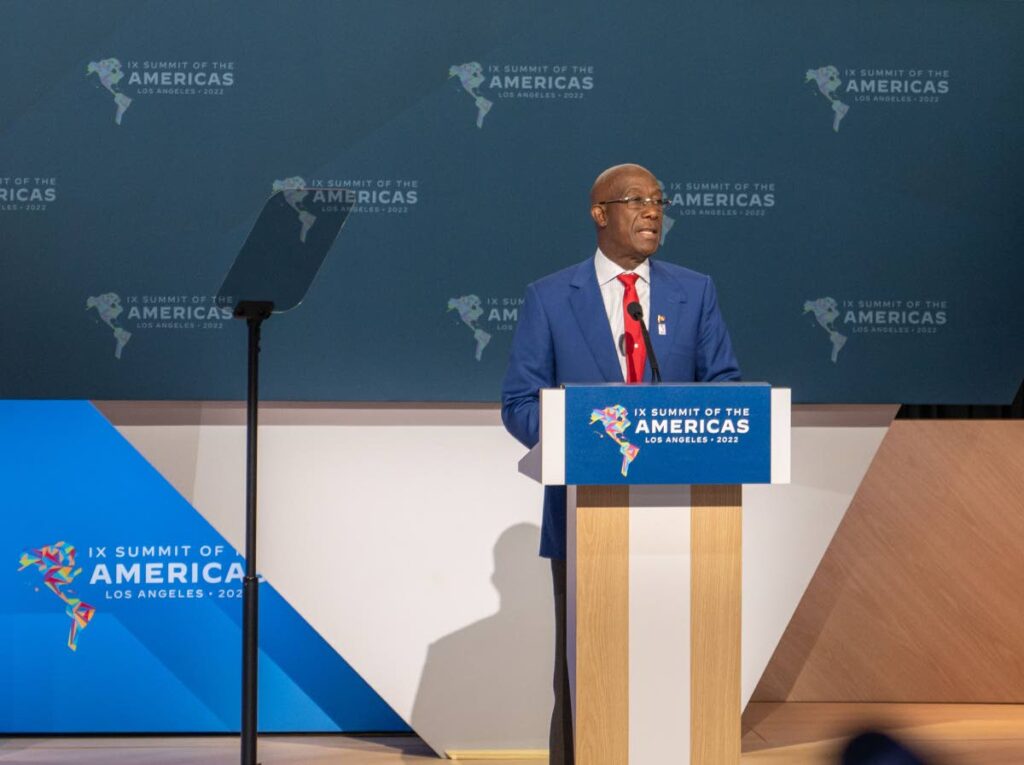Rowley: New 4% wage offer costs $2.5b in back pay alone

It will cost Government $2.5 billion in back pay alone to cover the Chief Personnel Officer's latest offer of a four per cent wage increase over six years, instead of eight, to public sector workers, the Prime Minister disclosed on Saturday.
Dr Rowley noting the labour movement's rejection of the initial two per cent offer over an eight year period – 2014-2021, said going higher comes at a steeper cost.
"The offer has since been increased to four per cent over a six year period 2014-2019, which will cost Government $2.5 billion in back pay up to June 2022, and be committed to a further $500 million, annually, just for the civil service, teaching service, defence force, protective services and daily rated workers," he said.
"To this must be added the cost of a wage increase for statutory authorities and state enterprises, which will increase the total cost of a four per cent increase by as much as a further 50 per cent. Should negotiations be settled at eight per cent, those figures will literally double, taking back pay to over $5 billion and the annual recurrent cost to over $1.5 billion."
Rowley, who is out of the country, laid out the fiscal challenge to the wage negotiations in his Labour Day address. The Prime Minister remained in California after the recent ninth Summit of the Americas in the US to undergo a medical check-up.
In his statement, he maintained his Government has sought to be "financially-prudent, performing a tight, day-to-day, balancing act in spending, because it has a full grasp on the realities facing this country."
He referred to the Central Bank's recent caution that the energy windfall owing to higher oil and gas prices triggered by the Ukraine-Russia war was expected to be temporary and should be used to fund the adjustments in the budget which stem from the impact of the covid19 pandemic.
He said the bank added that “care must, therefore, be taken to avoid considering this windfall as permanent.”
"This could be likened to an unrealistic situation of a person, who maintains a comfortable, heady lifestyle, and when an unexpected financial benefit comes, he or she immediately splurges it – still continuing to borrow to pay his/her monthly rent. Fellow citizens, should Trinidad and Tobago pursue such an example?" the Prime Minister asked.
In June, Finance Minister Colm Imbert, currently the acting PM, said whatever amount the back pay is, Government would have to borrow to cover it. Also, in a tweet in May, Imbert said the two per cent offer would cost $300 million in back pay and an additional $300 million in recurring expenditure for public servants.
Addressing the labour movement, Rowley said he is "a bit puzzled" by the "strong language" of labour leaders in their push back to the wage offers, which did not "reflect, either normal industrial relations practice, or the economic realities facing" the country.
He reiterated previous statements that the "unplanned, short-term financial boost" arising out of the war would be shared among state employees. He also said he was aware of the challenges to the working environment which is being changed by increasing new digital technologies.
"Over the past decades, the digital revolution has been transforming the retail, media, entertainment, advertising industries; in short up-ending old business models and industries," he said.
"On the horizon is the larger prospect that every job, every business, every aspect of 21st century life will be restructured. No job, particularly, the unskilled, no company, no government, no economy will be immune to disruption in this century. The reality of the century is a fast-paced revolution, which is re-shaping every pocket, every job, every family, every infrastructure, all governments, all economies."
It is a scenario that is also faced by the private sector, with implications for the well-being of the wider population, said Rowley.
"Larger challenges are still ahead, because every organisation, private or public, will have to transform itself, from within – in multiple ways or fade and die. The psycho-social-economic effects of such changes on the average worker worldwide, regardless of where they are placed, are yet to be understood."
He laid the case for the labour movement to get workers to understand what lies ahead.
"The challenge to the labour movement is to ensure that the worker in this century understands the realities, places his or herself within the larger picture and recognises the need to ‘up-skill’ for the new market – not lose energy on short-term gains.”
On the prospects of an "economic safety net," Rowley reminded the country of the billions borrowed to provide day-to-day relief during the covid19 pandemic.
Rowley, however, sounded a note of reassurance that the future "is not all gloom" as "new doors, new possibilities are opening."
He said TT was not alone in its challenges and that the world was facing this difficult time.
"Our difficulty will only overcome us if we fail to see it for what it is and make long-term decisions on short-term illogic that defy our God-given talents.
"It goes without saying that the role of the labour movement has been pivotal in advocating for a fair and better deal for the employees of this country and labour will always be expected to protect and defend the interest of the working class, especially, those who are facing the worst of these trying times."
Government, Rowley said, stood by the labour movement in this role.


Comments
"Rowley: New 4% wage offer costs $2.5b in back pay alone"